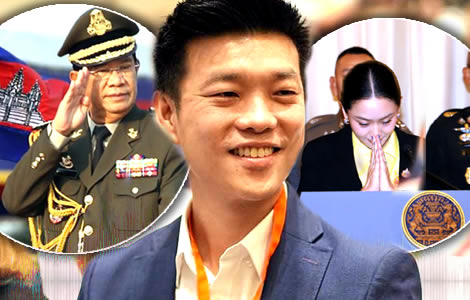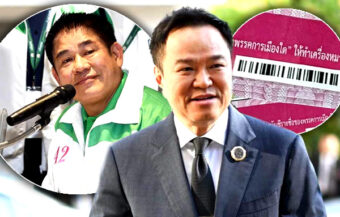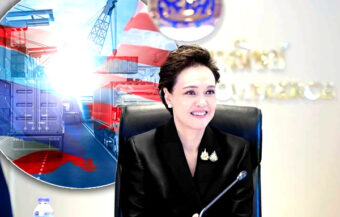Public abandons PM Paetongtarn as shock NIDA poll shows People’s Party soaring to 46%. Pheu Thai collapses, military coup fears rise. With a decisive court ruling looming, Thailand faces a pivotal moment—change or crisis. Elite resistance may yet block reform.
A new NIDA poll sends a stark warning to Thai politics. On the brink of a Constitutional Court ruling that could topple Prime Minister Paetongtarn Shinawatra—and just after a rally calling for a military coup—massive public support has surged for the People’s Party. This party, born from the Move Forward Party that won the last election, now stands as the clear alternative. The poll’s results leave no doubt: the Pheu Thai Party—and Paetongtarn—have no road back. It’s time to act decisively. Thailand must put democracy above party loyalty and personal ambition. Otherwise, another political deadlock will hand the military the excuse it needs to seize power again.

Thailand’s political landscape is entering a decisive crossroads. First, the National Institute of Development Administration (NIDA) released its “2nd Quarterly Political Popularity Survey 2025.” Conducted between June 19–25 with 2,500 respondents, it reflects broad representation. Surveyors asked respondents about both their preferred political party and prime ministerial candidate.
The results were seismic. The People’s Party now leads with 46.08% support. That figure is nearly half of all surveyed voters. Meanwhile, the ruling Pheu Thai Party lags at just 11.52%. By contrast, Ruam Thai Sang Chart finishes a distant second with 13.24%.
Furthermore, Bhumjaithai secures approximately 9.76% in party preference. Importantly, 7.72% of respondents remain undecided. Consequently, even smaller parties like Thai Sang Thai (4.20%) and Palang Pracharath (2.88%) still matter.
Voter shift driven by disillusionment with dynasty politics fuels the People’s Party and Nattapong’s rise
Along party lines, the survey captures an unmistakable wave toward change. Young, urban voters are especially shifting away from traditional parties. Many cited disillusionment with dynastic politics and patronage networks. As a result, trust in the People’s Party—and its progressive message—is surging.
Turning to the preferred prime minister, People’s Party leader Nattapong Ruangpanyawut tops the list at 31.48%. This places him well ahead of any contender. Next, 19.88% of respondents said they hadn’t found the right candidate. Thus, nearly one-fifth of voters remain open to persuasion.
In third place, General Prayut Chan-o-cha—a royal advisor and former coup leader—draws 12.72%. His persistent appeal suggests a segment still favours stability over change. Fourth place goes to Anutin Charnvirakul of Bhumjaithai with 9.64%. Notably, Prime Minister Paetongtarn Shinawatra falls to fifth with 9.20%. Therefore, her support has collapsed following the audio clip scandal with Cambodian Prime Minister Hun Sen.
Importantly, candidates further down include Pirapan Salirathavibhaga (6.48%), Khunying Sudarat Keyuraphan (6.12%), and General Prawit Wongsuwan (1.48%). Plus, 2.92% of respondents named other figures like Chalermchai Sri-on or Chuan Leekpai. Still, several political quarters remain undecided or disengaged.
NIDA poll exposes dissatisfaction but power remains locked in elite-controlled electoral structures
Taken together, the NIDA poll reveals widespread dissatisfaction among voters. They want new leadership beyond dynasties and patronage. The People’s Party—and Nattapong in particular—embody that aspiration. Their rise suggests growing political maturity among younger, better-educated Thais.
Yet structural barriers to some extent discount this momentum. Certainly, it is in electing MPs that a party shows its power. This is the problem with the People’s Party. Thailand’s “Big House” politics and patronage systems remain deeply entrenched. Local power brokers still control candidate selection and resource distribution in elections.
Therefore, translating poll figures into seats requires overcoming these networks. Moreover, prime ministers are chosen by MPs—not directly by voters. Consequently, even near-majority public support doesn’t guarantee parliamentary dominance.
To complicate matters further, the Constitutional Court is expected to rule next week on allegations that Paetongtarn breached the 2017 constitution. Her extraordinary phone call on June 15 with Cambodian leader Hun Sen was disastrous. It has opened her up to charges of weakness, treason and being unfit for office. If disqualified, she will have to vacate office. Thus, the ruling Pheu Thai Party would face a sudden leadership crossroads.
Pheu Thai faces bleak options as Chaikasem emerges as the only fallback candidate despite major drawbacks
So far, the party has two options: either stick with Paetongtarn or fall back on their backup candidate from the 2023 election list. Because election rules prohibit otherwise, the only constitutional option is Chaikasem Nitisiri. He is elderly, and reportedly in ill health, but expresses a willingness to serve.
Still, he lacks charisma and youth appeal. Additionally, public enthusiasm for Pheu Thai is clearly waning. The party betrayed the public after the May 2023 General Election by ditching the Move Forward Party, the precursor to the People’s Party.
The latest poll shows the public feels deeply let down, angered by the actions and indeed personality of Prime Minister Paetongtarn revealed in a nine minute audio clip. Certainly, it appears now that she is finished in Thai politics. This comes despite at one point being the most popular choice as Prime Minister.
As a result, Mr. Chaikasem as prime ministerial proxy risks alienating the remaining core base. Therefore, the party confronts a painful choice: cling to Paetongtarn if she doesn’t suffer court sanction or pivot to a weak candidate and risk electoral collapse. Either way, it is a losing proposition.
This dilemma is exacerbated by institutional volatility. Thailand’s democracy is susceptible to non-electoral interventions—courts, military and backroom influence.
For example, Samak Sundaravej was removed in 2008; Yingluck Shinawatra was removed in 2014. These events reflect a wider trend: elected governments can be unseated by unelected powers. Therefore, the NIDA poll’s message, as strong as it is, may not be easily translated into a stable government.
Public trust erodes as Pheu Thai fractures while People’s Party gains strength through popular momentum
Still, the stakes are clear. If Paetongtarn remains, she must fight on. Yet her authority is hollowed. Public trust is eroded perhaps permanently.
Therefore, she will struggle to govern effectively. If she steps down—but lets Chaikasem take over—Pheu Thai risks fragmenting. Some MPs may defect. Big House allies may defect to protect their patronage platforms.
Conversely, the People’s Party has room to consolidate. Nattapong’s clean reputation and modern messaging attract the disillusioned urban electorate. Moreover, momentum is building: media coverage, social networks, and youth engagement reinforce their surge. Therefore, they stand ready to challenge not only through polls—but also in parliament.
It may be time for the Shinawatra family and the Pheu Thai Party to do something uncharacteristically noble. To cooperate with the People’s Party in the interests of preserving Thailand’s democratic future right here and now.
However, electoral maps aren’t redrawn by opinion polls alone. The first-past-the-post and party-list systems favour province-based clans. These systems benefit established parties.
Hence, even if the People’s Party wins big in urban regions, rural constituencies dominated by Big House networks may resist. Similarly, the Senate—reportedly controlled by the Bhumjaithai Party—is already blocking constitutional change.
NIDA poll reshapes expectations as coup fears rise and Pheu Thai’s internal divisions deepen dramatically
Yet, the NIDA poll may still serve as a catalyst. First, it confirms the People’s Party as the only viable national player for government. Second, it helps donors, voters, and local leaders feel confident in aligning with them. Third, it increases pressure on institutions to bend—or break—their traditional habits.
Notably, the Saturday public protest at Victory Monument reflected unrest among conservative Thais. It also revealed something deeply troubling. Demonstrators spoke of “restoring order” while criticising elites. Some even made vague suggestions of military intervention. Consequently, justification and calls of a coup are resurfacing.
Meanwhile, the People’s Party sees an opportunity to channel protests into democratic reform rather than disruption.
At the same time, Pheu Thai remains under siege. Its internal cohesion is weakening. Internal factions are disputing who should lead if Paetongtarn exits.
For instance, there is unease about the new cabinet seat allocations. Some fear a leadership contest could deepen splits. Others believe moving quickly to Chaikasem preserves unity. Meanwhile, external pressure mounts: protesters, court cases and poll results all point to letting go.
Pheu Thai unravels as elite panic grows and only the People’s Party offers hope for democratic renewal
Therefore, Pheu Thai finds itself at a strategic impasse. Stay loyal to Paetongtarn and risk dissolution. Or appoint Chaikasem and risk losing relevance. Either way, the party appears defenceless. And when the party is vulnerable, voters move elsewhere—and Thailand’s next chapter becomes unpredictable.
Still, amidst this chaos, the People’s Party is emerging as the only credible force for democratic renewal. Its clean slate, combined with popular support and youth-driven popular appeal, makes it uniquely positioned. However, the problem is that it has presently no prime ministerial nominee for the top job.
This is because it was only formed in the aftermath of the demise of the Move Forward Party. Certainly, this highlights the appallingly restrictive and impractical nature of the 2017 Constitution and its power structures—something colourfully expressed by former PM Thaksin Shinawatra last year.
Certainly, the rewriting of that constitution is a shared goal of both democratically aligned parties. Perhaps there is also room for common ground. Undoubtedly, any potential rapprochement between the Pheu Thai Party and the main opposition party faces a conundrum if the political stakes grow perilous.
Fragile coalition faces collapse as opposition contact and early election both threaten instability
Meanwhile, any move by the Pheu Thai Party towards the main opposition party could collapse the already weakened coalition government. The progressive party’s perceived links to efforts to roll back the lèse-majesté provisions make this a red line for establishment parties.
At the same time, simply rushing headlong into dissolving parliament and calling a new General Election is also, as events in 2006 and 2014 have shown, a recipe for trouble. This has to do with the weakened power of a caretaker government.
Bangkok protest passes off with no overnight camp. Meanwhile, the PM prepares for July 1st court date
Hun Sen’s mask falls. Speech on Friday clearly showed deliberate ill will to collapse Thailand’s democracy
Crucial test for Prime Minister Paetongtarn on Saturday as the Yellow Shirts take to Bangkok’s streets
PM Paetongtarn names herself Culture Minister also in new cabinet ahead of the Constitutional Court ruling
Thaksin’s Udon Thani onslaught and attacks on ‘shitty laws’ is an open salvo in a battle with Bhumjaithai
Yet everything about Thailand’s political environment stands in the path of democratic renewal. Electoral rules, Big House networks, senators from an election tainted by fraud—they all test its resilience. The country’s democratically aligned parties are learning that they are operating under an impossibly restrictive constitutional order in trying to deal with what are normal political developments in other countries.
Ultimately, the next few weeks may determine whether Thailand begins a new democratic phase—or slides further into another institutional paralysis.
With Paetongtarn’s fate pending and the NIDA poll results, the political message is clear. Whatever comes next, one truth is undeniable: Thai voters want change. Whether the kingdom’s elite will allow it is another question entirely.
Join the Thai News forum, follow Thai Examiner on Facebook here
Receive all our stories as they come out on Telegram here
Follow Thai Examiner here
Further reading:
Prime Minister Paetongtarn pulls her government back from the brink with emotional televised apology


















